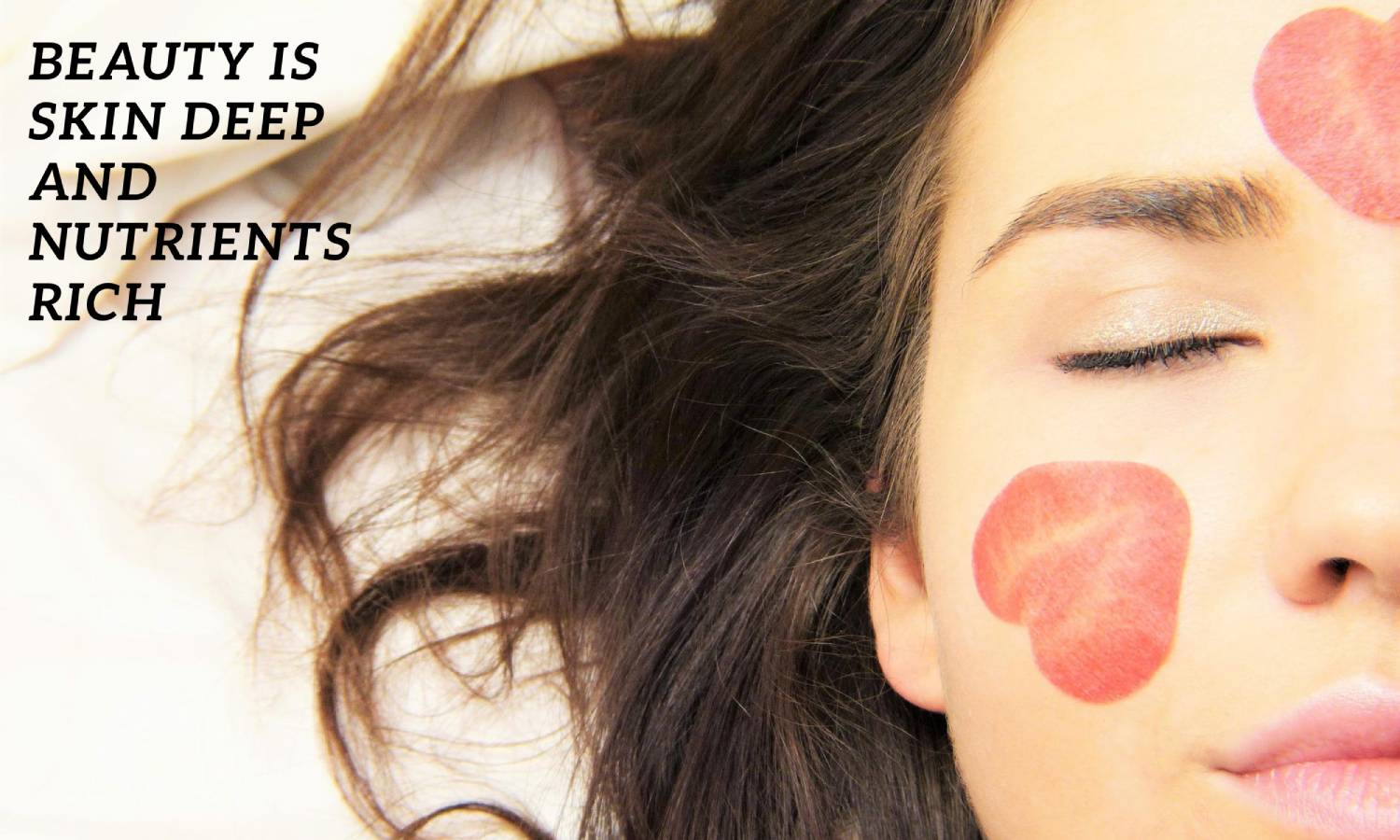Beauty of skin and body is dependent on the nutrients we supply. Our skin faces daily challenges like sun damage, dryness, acne, wrinkles, aging/thinning, and injuries. The wear and tear on daily basis needs maintenance. Just like the rest of your body requires proper nutrition, your skin too needs certain vital nutrients. Skin starved of vital nutrients can make you less beautiful!
Skin is the largest organ in the body and second largest for detoxification. Crucially, it is the only organ we have on-going visual access to and its appearance can reflect and give useful insights into the health of other systems within the body. So, it turns out beauty isn’t just skin deep!
Innumerable skincare products are available in the market that claim to provide you the healthiest and most youthful-looking skin. But it will do little good if you spend a fortune on these products and not nourish your skin from within. External skincare will give you the best results only when complemented with the essential vitamins for skin received from a proper diet.
The skin’s barrier performs several important functions, primarily helping to trap water molecules and prevent water loss through the pores. When the skin’s barrier function is impaired due to dehydration, poor diet, over-exposure to UV rays or from using products that strip the skin’s natural oils, the skin will no longer be able to perform these important functions resulting in dry, flaky, inflamed skin with an increased risk for aging.
Signs of aging on face
- Loss of skin suppleness
- Dull lack luster skin
- Blisters
- Acne
- Pigmentation
- Black heads
- Visible veins
- Wide pores
- dry lips
The food you eat and fluids you consume all have impact on your skin health. The active nutrient ingredients that are required for skin radiance are vitamin A, Vitamin B6, Vitamin E, Omega-3 fatty acids, lutein, lycopene, Collagen, Biotin, Glutathione, all these antioxidants control free radicals which are produced as a by- product of biochemical reactions. Free radicals are the primary reason of premature skin aging.
VITAMIN E
Vitamin E is an antioxidant found on the skin surface. It is stored in our fat cells. We depend on adequate dietary intake to maintain optimum levels. Whole food sources of vitamin E include: spinach, turnip greens, almonds, peppers, asparagus, kale, broccoli, Brussel sprouts and olive oil. As vitamin E is fat soluble, it’s important to eat these foods with healthy fats to boost the body’s absorption.
VITAMIN A
Vitamin A (also known as retinol), is an important nutrient in the prevention of acne. It reduces excess oil production; supresses androgen hormones such as testosterone; and promotes skin cell turnover, which in turn prevent blocked pores. Lack of vitamin A can cause skin to become rough, dry or scaly. Small, rough, raised bumps on the back of the arms are a common sign of vitamin A deficiency. Pre-formed vitamin A, which is immediately ready for use by the body, is found in animal products. These include liver, kidney and other meats, butter, and egg yolks. Pro-vitamin A, found largely in plant-based foods, has to be converted by the body into the active form before use. The most common type of pro-vitamin A is beta-carotene. Food sources of carotenoids such as beta-carotene may reduce the risk for cancers. Food sources include orange and yellow fruits and vegetables. Broccoli, spinach and most dark green, leafy vegetables are also good sources. Pregnant women in particular are advised to take caution when considering vitamin A supplementation. If you think you may suffer from low levels of this vitamin it is best to seek professional advice.
ZINC
Zinc is an essential mineral. In skin it assists in the proper structure of cell membranes, improves wound healing and has anti-inflammatory effects. Like Vitamin E, it also helps protect against harmful UV rays. Dietary sources of Zinc include meat products, seafoods like oyster and shellfish, and vegetable sources like legumes, pumpkin seeds, and nuts. Zinc is also available in supplemental form but caution is needed as long term or excessive supplementation can cause imbalances with other minerals in the body.
OMEGA-3 FATTY ACIDS
Many skin conditions such as eczema, psoriasis, rosacea and acne are inflammatory by nature. Therefore, reducing inflammation is a key therapeutic aim for improving symptoms. This is done by ensuring that we have a balanced Omega 3 to Omega 6 ratio. In simple terms, Omega-3 fatty acids have anti-inflammatory properties. Foods rich in Omega-3 fatty acids include: oily fish – salmon, mackerel, anchovies, sardines, herring (SMASH” for short), flaxseeds, chia seeds and walnuts. Food high in Omega 6 Fatty acids that we may need to reduce intake include: sunflower oils, processed foods, excessive meat and dairy products. The key is getting a balance. The ideal ratio is around 1:4 Omega 3 to Omega 6.
PROBIOTIC, FERMENTED FOODS
The “skin-gut axis” shows an association between gut problems and skin disorders. Intestinal permeability (also known as “leaky gut”) occurs when the lining of the digestive tract is damaged. This allows proteins from foods and environmental toxins to pass into the blood stream. This leads to inflammation, which can be reflected in our skin. Supplementing our diet with fermented foods such as probiotic yogurt and kefir is a great way to support both gut and skin health. They provide beneficial probiotic bacteria for the gut that keeps your biome diverse.
SKIN HEALTH
For healthy skin, we should eat a wide variety of fruits, vegetables, legumes (beans, lentils, peas) and whole grains – and if desired, a small amount of fish and meat. Interestingly the preparation of food is emerging as a key factor in making us beautiful from the inside out. So, start boiling your veggies and soaking those nuts.
Take care of skin and beauty will last forever!
References


1 Comments
Eugenia
Truy no mattter iif someone doesn’t be aware of thnen its uup
to othe viewers that thy will help, so here it occurs.